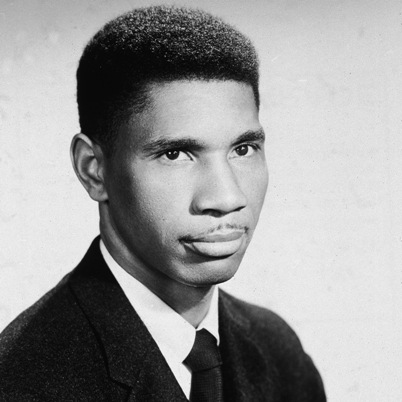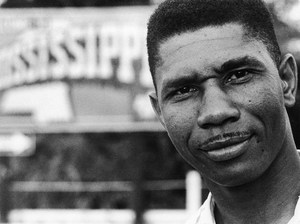 Civil rights activist Medgar Evers was born July 2, 1925, in Decatur, Mississippi. In 1954, he became the first state field secretary of the NAACP in Mississippi. As such, he organized voter-registration efforts, demonstrations, and economic boycotts of companies that practiced discrimination. He also worked to investigate crimes perpetrated against blacks. On June 12, 1963, Evers was shot dead.
Civil rights activist Medgar Evers was born July 2, 1925, in Decatur, Mississippi. In 1954, he became the first state field secretary of the NAACP in Mississippi. As such, he organized voter-registration efforts, demonstrations, and economic boycotts of companies that practiced discrimination. He also worked to investigate crimes perpetrated against blacks. On June 12, 1963, Evers was shot dead.
Civil rights activist. Born July 2, 1925, in Decatur, Mississippi. After growing up in a Mississippi farming family, Evers enlisted in the United States Army in 1943. He fought in both France and Germany during World War II before receiving an honorable discharge in 1946. In 1948, he entered Alcorn Agricutural and Mechanical College (now Alcorn State University) in Lorman, Mississippi. During his senior year, Evers married a fellow student, Myrlie Beasley; they later had three children: Darrell, Reena, and James.
Upon graduation from college in 1952, Evers moved to Philadelphia, Mississippi, where he began working as an insurance salesman. He and his older brother, Charles Evers, also worked on behalf of the National Association for the Advancement of Colored People (NAACP), organizing local affiliates in Philadelphia.
In 1954, the year of the momentous Supreme Court decision Brown v. Board of Education, which purportedly ended segregation of schools, Medgar quit the insurance business; he subsequently applied and was denied admission to the University of Mississippi Law School. His unsuccessful effort to integrate the state’s oldest public educational institution attracted the attention of the NAACP’s national office. Later that year, Evers moved to the state capital of Jackson and became the first state field secretary of the NAACP in Mississippi.
 As state field secretary, Evers recruited members throughout Mississippi and organized voter-registration efforts, demonstrations, and economic boycotts of white-owned companies that practiced discrimination. He also worked to investigate crimes perpetrated against blacks, most notably the lynching of Emmett Till, a 14-year-old African-American boy who had allegedly been killed for talking to a white woman.
As state field secretary, Evers recruited members throughout Mississippi and organized voter-registration efforts, demonstrations, and economic boycotts of white-owned companies that practiced discrimination. He also worked to investigate crimes perpetrated against blacks, most notably the lynching of Emmett Till, a 14-year-old African-American boy who had allegedly been killed for talking to a white woman.
As early as 1955, Evers’ activism made him the most visible civil rights leader in the state of Missisippi. As a result, he and his family were subjected to numerous threats and violent actions over the years, including a firebombing of their house in May 1963. At 12:40 a.m. on June 12, 1963, Evers was shot in the back in the driveway of his home in Jackson. He died less than a hour later at a nearby hospital.
Evers was buried with full military honors in Arlington National Cemetery, and the NAACP posthumously awarded him their 1963 Spingarn Medal. The national outrage over Evers’ murder increased support for legislation that would become the Civil Rights Act of 1964. Immediately after Evers’ death, the NAACP appointed his brother Charles to his position. Charles Evers went on to become a major political figure in the state; in 1969, he was elected the mayor of Fayette, Mississippi, becoming the first African-American mayor of a racially mixed Southern town since the Reconstruction.
A police and FBI investigation of the murder quickly unearthed a prime suspect–Byron De La Beckwith, a white segregationist and founding member of Mississippi’s White Citizens Council. Despite mounting evidence against him, a rifle found near the crime scene was registered to Beckwith and had his fingerprints on the scope, and several witnesses placed him in the area—Beckwith denied shooting Evers. He maintained that the gun had been stolen, and produced several witnesses to testify that he was elsewhere on the night of the murder.
In 1964, Beckwith was set free after two all-white juries deadlocked.
Today we remember the legacy of Medgar Evers!
Source: Bio






Pingback : An Important Part Of American History – Medgar Evers - As Black As Us